6 Secretary of State Appointments Trump Could Make That Wouldn't Suck
These names would be better than most of the ones being floated.
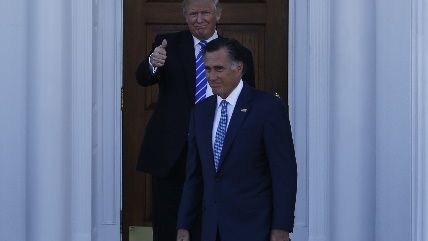
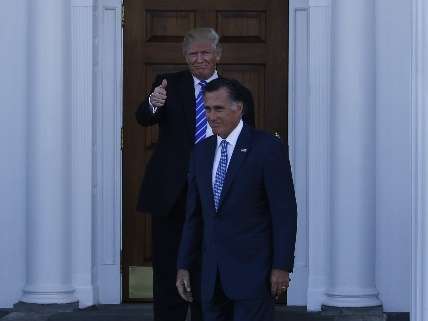
A number of names have been bandied around as potential Secretary of State nominees for Donald Trump: John Bolton, Newt Gingrich, Rudy Giuliani, even Mitt Romney. None of these selections would be especially surprising but neither do they represent any kind of break from "the establishment" against which many Trump voters voted.
Finding a person who doesn't accept status-quo assumptions about foreign policy and America's supposedly indispensable place in the world—or even one who is just willing to take a fresh look at U.S. relations with the rest of the globe—isn't easy. Decades of bipartisan foreign policy have produced generally pro-intervention analysts, activists, and politicians.
Some Ron Paul supporters who see a spark of noninterventionism in Trump have launched a petition for Trump to nominate the former Republican congressman as secretary of state. A Change.org petition notes the Washington Post's Jennifer Rubin was concerned about such a possibility while Paul called it an "unlikely scenario." At the age of 83, it's difficult to see Paul as a cabinet member under any circumstances. That said, Paul definitely agrees with Trump's election-night refrain about wanting the United States to have friendly relations with any country willing to have friendly relations with the U.S. And considering one underlying principle of a Paul State Department would be not inserting the U.S. into every imaginable conflict (diplomatic or otherwise) around the world, Secretary Paul not traveling overseas all the time would be a benefit.
Paul would make an intriguing, establishment-challenging and, most importantly, non-interventionist choice for secretary of state. He would be a great selection. There is also zero chance of that happening. Here are other selections Trump could make that would be pretty good:
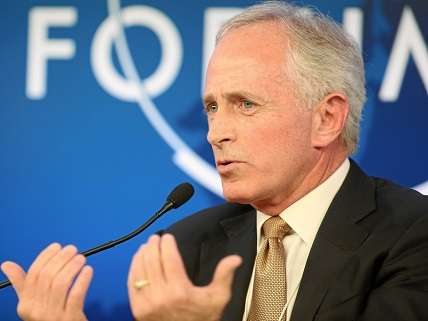
Bob Corker
Sen. Rand Paul (R-Ky.) has emerged as a potent Republican critic of the Trump transition. Last week he said he could find enough votes to block a Bolton nomination, and also criticized the idea that Giuliani might be nominated. "Giuliani is a great friend of the president-elect," Paul acknowledged. "Maybe there could be another position in the cabinet that wouldn't be putting him in a place where he is at odds with the president's vision on foreign policy."
The Republican majority in the Senate has been whittled down from 54 to 51 or 52 (a December 10 run-off will determine whether Louisiana sends a Democrat or Republican to the Senate to replace David Vitter), so Paul does not need to find all that many votes to block any Trump nomination, especially if it's one that finds little or no support among Democrats.
Paul suggested Sen. Bob Corker (R-Tenn.) as a potential secretary of state nomination for Trump, saying he would "sail through" with more than a dozen Democrats also supporting him. "I would say, while not being libertarian, [Corker] is more of a reasonable, realist kind of person," Paul told Reason last week. "I think he would be less likely to say tomorrow we need to drop bombs on Iran."
For Paul, any potential secretary of state nominee that "didn't learn the lesson of the war in Iraq" would not earn his support. Corker has compared the U.S. invasion of Iraq to beating a hornet's nest with a big stick. He was also one of three Republican senators in the Foreign Relations Committee to vote in favor of the U.S.-Russia strategic arms reduction treaty (START) and one of 13 Republicans who voted in favor of it on the Senate floor. Corker was also skeptical of the 2009 Afghan troop surge. "I have no idea what it is, other than sending additional troops," Corker told AFP. "I hope we dig a lot deeper."
Corker has said he was "in the mix" for a possible Trump administration role.
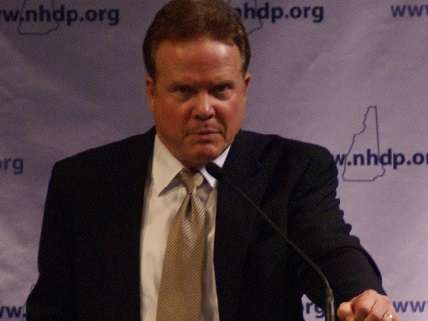
James Webb
Former Sen. James Webb (D-Va.) briefly ran for the Democratic nomination for president in the 2016 election cycle, dropping out less than four months after announcing his run. "Some people say I am a Republican who became a Democrat, or that I often sound like a Republican in a room full of Democrats or a Democrat in a room full of Republicans," Webb said at the time. "I fully accept that my views on many issues are not compatible with the power structure and the nominating base of the Democratic Party."
In retrospect, Webb, who appealed to the kind of swing voter in the Rust Belt that tipped the election to Donald Trump, may have been the strongest announced candidate Democrats had. On foreign policy, too, Webb provided an alternative that was less hawkish than Clinton, whose enthusiasm for war and intervention surely turned off some voters in the Midwest and beyond.
Webb, as Jim Henley noted in the November 2008 issue of Reason, was one of the "forthright anti-war candidates" Democrats finally decided to run in 2006 to take "real advantage of public dismay with the war." But Democrats, as Henley noted, were never fully comfortable with such positions, even when they exploited them. The success of 2006, Henley noted, "came in the face of the usual intraparty counsel to avoid losing 'credibility on national security'."
Webb's failure to launch in the presidential election was in part a symptom of the broader death of authentically anti-war candidates over the past several decades, even in the face of continued military failures in the 21st century. Webb has been a proponent of Congress reasserting its role in decisions about making war and was a critic of the U.S. war in Iraq and the 2011 intervention in Libya.
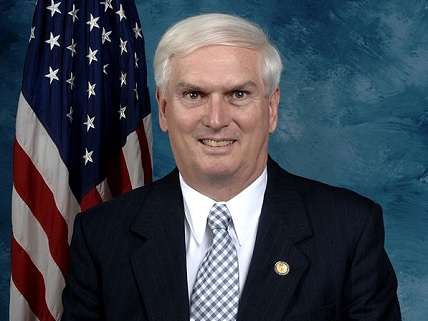
John Duncan
Rep. John Duncan (R-Tenn.) has served in Congress since 1988. While he voted in favor of the Gulf War resolution in 1991, he subsequently voted against the Iraq War in 2002, against bills to fund the war in Iraq, and in favor of setting a withdrawal date in 2007. He also voted against a bill to fund the Afghanistan war in 2010. Duncan was one of 10 members of Congress to try to sue President Obama over the intervention in Libya, for which the president received no Congressional authorization. Howard Phillips, the founder of what would become the Constitution party, called Duncan "one of the unsung heroes of Constitutional conservatism."
He was one of only six Republican members of Congress to vote against the 2002 authorization of the use of military force in Iraq. At the time, he said he thought the vote could end his political career, as everyone in his very conservative Republican district was telling him to vote in favor of the Iraq war.
He had learned his lesson from his support of the First Gulf War, saying he realized in the aftermath of the war that the threat had been "greatly exaggerated." Duncan also noted the role of partisan politics in manufacturing support for poor U.S. foreign policy. "Eighty percent of the House Republicans voted against the bombings in Bosnia, Kosovo, and all that," he told the American Conservative in 2005. "I'm absolutely convinced that if Gore or Clinton had been in the White House, 80 percent of the Republicans would have been against [the Iraq War too]." Such an understanding of the blinding nature of partisanship when it comes to U.S. foreign policy would be a huge asset in a Trump cabinet.
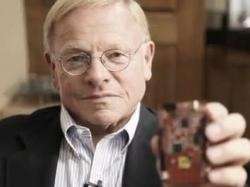
T.J. Rodgers
Trump and his transition team would be remiss if they only considered politicians for roles in the cabinet. Even the State Department could benefit from being guided by someone with extensive experience in the private sector. T.J. Rodgers, the founder of Cypress Semiconductor (and a supporter of Reason Foundation, the nonprofit that publishes this website), is one such candidate.
Throughout his career, Rodgers has been an unabashed defender of free-market capitalism. Given how much the freeing of markets have improved living standards and the quality of lives around the world and how only free markets can actually sustain sustainable development, the world and the United States would benefit from a secretary of state who was an unabashed advocate of real capitalism. Such advocates are not as common, or outspoken, in an American business world increasingly intermingling with government, but Rodgers has repeatedly warned against cronyism here and abroad. Appointing someone who understands this as secretary of state could go along way in restoring justified optimism among Americans and around the world.
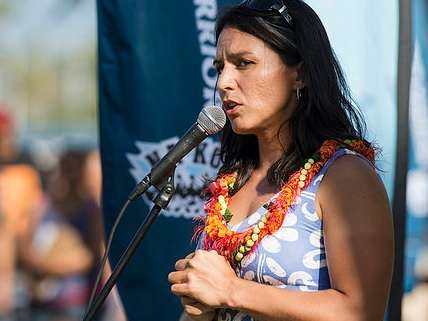
Tulsi Gabbard
Yesterday Rep. Tulsi Gabbard (D-Hawaii) met with President-elect Trump, and is reportedly being considered for an appointment at State, Defense, or the United Nations. Gabbard, a combat veteran who volunteered for a 12-month tour of duty in Iraq while serving in the Hawaii Army National Guard, would make an excellent choice for secretary of state, one that would send a clear and unequivocal message about Trump's interest in breaking from the deadly bipartisan foreign policy status quo.
After her meeting with Trump, she said she "felt it important to take the opportunity to meet with the president-elect now before the drumbeats of war that neocons have been beating drag us into an escalation of the war to overthrow the Syrian government—a war which has already cost hundreds of thousands of lives and forced millions of refugees to flee their homes in search of safety for themselves and their families."
Gabbard has been an opponent of U.S. intervention in Syria since coming to Congress in 2013, arguing that "intervention in Syria goes against America's national security, international credibility, economic interest, and moral center."
While she served in Iraq, she has said she was against the war, and has also called for an end to the Afghanistan war "as soon as possible," saying the U.S. should never have been in those places to begin with. She is also among a growing faction of members of Congress known as "Saudi skeptics," voting against U.S. arms sales to Saudi Arabia, and co-sponsored the House version of Rand Paul's legislation to stop arms sales to Saudi Arabia. In 2014, she backed Michigan Republican Rep. Justin Amash's amendment to defund the National Security Agency over its warrantless surveillance program.
Gabbard stepped down as vice chair of the Democratic National Committee in February so that she could endorse Bernie Sanders in the Democratic presidential primaries, after complaining that the DNC had not scheduled enough primary debates.
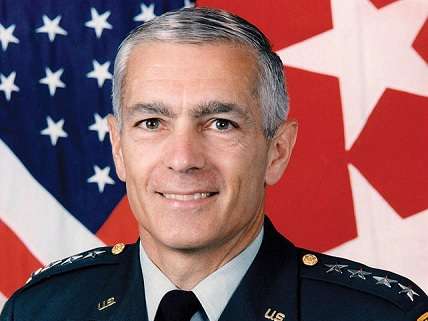
Wesley Clark
The former Democratic candidate for president earned credibility among non-interventionists for his opposition to the war in Iraq, but it wasn't enough to help him win the Democratic nomination in 2004. Clark has been skeptical about turning to military force first in U.S. foreign policy but also accepts that the U.S. is and ought to remain in a position of global leadership.
"You cannot win the war on terror by military force," Clark told Democracy Now's Amy Goodman in 2007. "It is first and foremost a battle of ideas. It is secondly a law enforcement effort and a cooperative effort among nations. And only as a last resort do you use military force."
"The truth about the Middle East is, had there been no oil there, it would be like Africa. Nobody is threatening to intervene in Africa," Clark noted to Goodman. "The problem is the opposite. We keep asking for people to intervene and stop it. There's no question that the presence of petroleum throughout the region has sparked great power involvement."
In his 2014 book Don't Wait for the Next War: A Strategy for American Growth and Global Leadership, Clark lays out what Walter Russell Mead called in the Wall Street Journal a Hamiltonian vision for U.S. foreign policy, where "a strong federal government closely linked to powerful firms in the private sector will promote economic development at home and ensure national security abroad." In this approach, the U.S. would keep its ability to project power globally but try to avoid conflict when possible.
The problem there is that the ability to project the power sometimes becomes enough to drive policymakers into conflicts. The intervention in Libya, which Clark criticized, could be seen through this framework. Many of the immediate costs of intervening were already baked in to the daily cost of maintaining the U.S. military and its ability to project power.
In a 2011 op-ed in the Washington Post, Clark warned that the American intervention that was then starting in Libya did not meet standards that ought to be met for U.S. interventions. Those include a clear national interest at stake, where the result would be deemed worth the cost of intervention; knowing the purpose of the intervention and how military action would achieve it; determining the political end game before the intervention begins; building public support, obtaining diplomatic and legal authority, and bringing allies into the process; avoiding U.S. and civilian casualties; and getting it over with quickly. Clark is an advocate of continued U.S. intervention in Syria, although it would not appear to meet all of the standards he laid out. Last year, he wrote that the idea of the U.S. and its allies creating "safe zones" for refugees "offers the best, lowest cost and the surest means of regaining some stability in the region."
Clark is no non-interventionist, but he is certainly a skeptic of intervention and an advocate for caution, which would make him a useful, if unavoidably flawed, member of a Trump cabinet.


Show Comments (144)